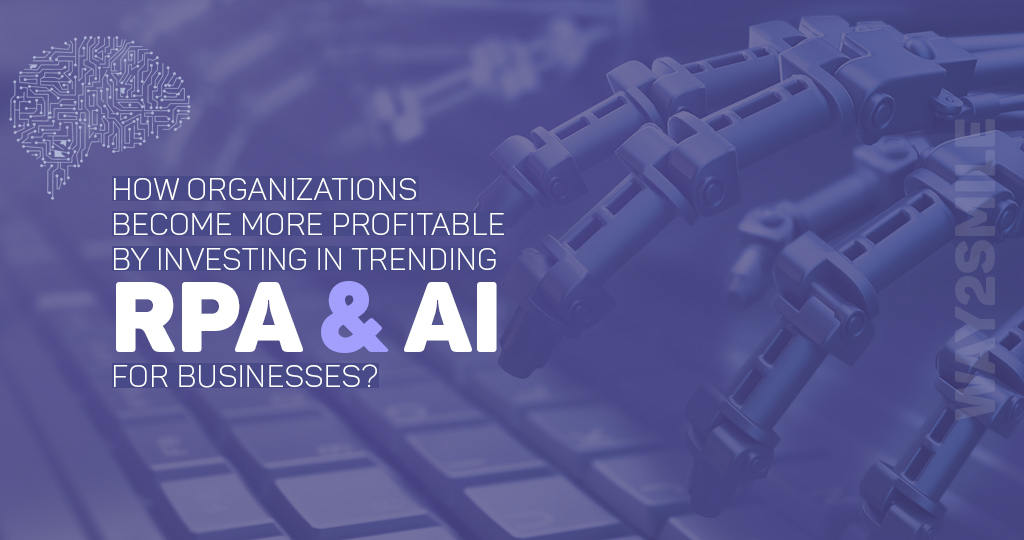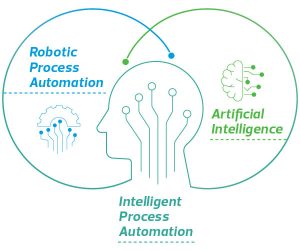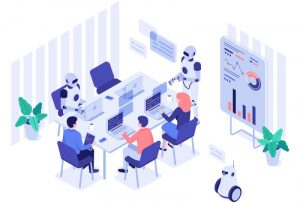
How organizations become more profitable by investing in Trending RPA & AI for Businesses?
Developing and implementing AI and RPA into business processes is not an easy task. Most companies integrate AI into their business processes by building or buying single-task bots such as NLP systems or vision recognition tools and adding them to processes by using traditional processes.
According to Mckinsey, AI & Machine learning and related technologies are now making their way with implementing Robotic Process Automation (RPA). This blending of AI and RPA offers intelligent process automation (IPA).
In addition to RPA and machine learning algorithms, IPA also includes process management software, natural language processing, and generation, and cognitive agents, or “bots”. In this blog, we have discussed the importance of combining these couple of technologies in business to achieve maximum profits.
Role Of RPA And AI In Business Transformations:
Why go with RPA & AI Solutions implementation?
- User-friendly.
- Flexibility.
- Non-disruptive.
- Scalability.
- Centralization.
- Ease of use.
- Security.
Intelligent Process Automation (IPA):

IPA can add up to 20% to 35% improvement in efficiency, 50% to 60% reduction in process time, and ROI can increase triple in percentage, says Mckinsey. Anyhow they are still in the early stages of the development and implementation process and becoming an end-to-end automated process would take time.
According to Gartner’s Analyst Moutusi Sau, presently there are no use cases associated with intelligent automation in the finance industry. Moreover, there have been some chatbot engines and AI decision tools, but you cannot build momentum on one particular solution. Hence, banks want to do more than one thing.
Let’s now have a look at the real-time example which happened. Germany‘s ZF Group, an automotive supplier that began implementing intelligence to business processes over a year and initiated their work with the creation of a bot to answer repetitive questions.
The company’s IT manager says, “Our business is loaded with a lot of repetitive tasks. We have a lot of emails coming into our inboxes with a lot of repeated questions”. Once, we implemented intelligence to our systems, there were different levels of intelligence was applied.
So, when picking vendors for its bots, the company had an eye for the future. He also added, “We are moving in the direction of automating the whole process chain.
In addition to a bot, we are also looking for an orchestration and integration platform, where we could easily leverage adopt these technologies and combine them with intelligence. So, while automated integration and orchestration is the end goal, the company also wanted a platform with built-in checks and balances.
Read Also – How can chatbots help you grow your business?
Yet another way is to add intelligent decision points into a traditionally-automated business process. This is what American Fidelity Assurance, an insurance policy provider is doing. One of the complex tasks faced by the company is routing emails that come in each day to the correct destination.
In past, humans were the ones who decided where each email should go. The Company’s VP said, “Is there a way to get advanced machine learning to learn from past data, from past decisions, and make the same decisions which humans would make?”.
He also added, “In the new email process, we integrated RPA component with the machine learning component and the combination of these two decides where the email has to be routed”. In most cases, traditional approaches to RPA will hit a decision point which is completely challenging for a simple automation process.
Currently, the enterprise is looking at using Artificial Intelligence for a process running to automate process discovery, rather than having a business analyst figure out what happens in a company. To turn and move towards automation, Digital Transformation Companies are taking the next stage.
Read Also – Popular ways to introduce your business to the public via Digital Transformation
Applications of AI & RPA for businesses:

Though RPA and AI are similar to each other, they deal with their process differently. RPA is entirely efficient but it performs only the tasks which a user or programmer instructs. On the other hand, AI can teach itself.
RPA can automate all the rule-based tasks, and AI can bridge the gap where RPA fails. RPA also deals with structured data. While AI is used to gather insights from semi-structured and unstructured data in the form of text, scanned documents, webpages, and PDFs. AI adds value by processing and converting the data to a structured form for RPA to understand.
Undoubtedly, one can enjoy multiple Benefits Of Implementing RPA And AI In Business and reap profits when they are leveraged together. If enhancing ROI is a goal, it is important to utilize both these technologies and gain maximum benefits.
Conclusion:
Being one of the IT Consulting Companies, we are here to implement RPA and AI for business with our strategies. If you are looking to leverage these technologies at an affordable cost, we people are here to help you with the implementation process.
You can get in touch with us by quickly filling the form beside you!
